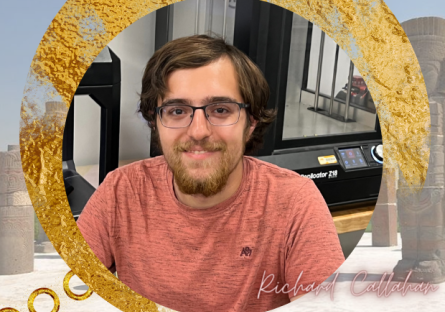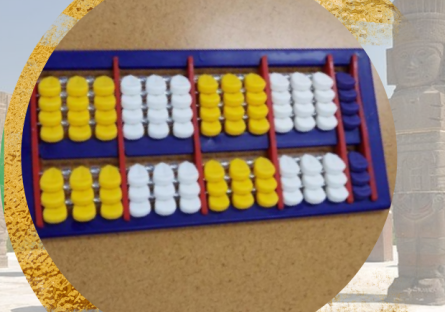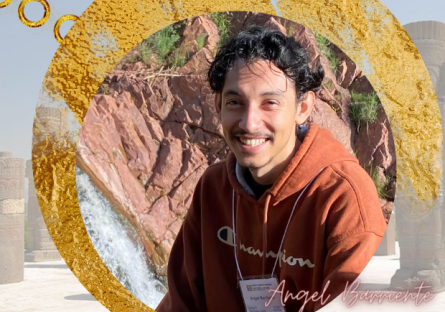


Math Professor Says Nepohualtzintzins Help Children Who Struggle with Arithmetic
Teamwork made the dream work for a couple of Estrella Mountain Lions who were charged with replicating a nepohualtzintzin last year.
A nepo what, you ask?
A nepohualtzintzin, or nepo as those in the know refer to it, is a Mesoamerican calculator. It’s a type of abacus. According to Estrella Mountain Community College (EMCC) Math Professor Sharon Stefan, who initiated the replication project, nepos can help elementary school children who have a difficult time grasping basic arithmetic. She explained that with the nepo, children are able to learn conceptually what it means to multiply and divide.
“I teach a mathematics class for future elementary school teachers,” Professor Stefan said. “I thought having copies of the nepo would be an excellent tool for these future teachers to use in their classrooms.”
Unfortunately, nepos are handmade and can be quite fragile, not to mention pricey. So Professor Stefan and EMCC STEM Coordinator Liahla Roberts put their heads together and came up with an internship opportunity for two students to figure out how to 3D print a nepo.
The students, Angel Barriente and Richard Callahan who have both since graduated and transferred to Arizona State University, quickly got to work brainstorming design options with Professor Stefan.
“The nepo I presented to them was one piece, with wiring that was pretty fragile, and if not handled well could break,” Professor Stefan said. “I basically needed something childproof, so Angel and Richard discussed with me possible ways to design it. It was amazing to listen to these two because Angel could see the needed structural design while Richard focused on the code to create it.”
The teamwork aspect of the internship, which ran during the fall semester, was one of the things Angel and Richard said they enjoyed most.
“One of the most valuable things I learned as I worked on the nepo was how to cooperate with another individual on a larger project,” Richard said. “We worked together and gave each other feedback on our models, and we learned how to compromise and cooperate using software. I am currently studying to become a Computer Systems Engineer, so getting experience working in a team and working on a project was quite invaluable.”
Angel and Richard worked so well together that they were able to create a working print file and successfully print a nepo in EMCC’s Makerspace by the end of the internship.
“I felt really happy with the final product because it came out really good and it was my first official project that involved improving and mass producing a product,” said Angel, who is majoring in mechanical engineering. “Plus, the purpose for the project was altruistic in nature so that also contributed to the emotions I was feeling at the time.”
Professor Stefan’s inspiration for the nepo replication project came after she attended a presentation in 2019 by a couple of math professors from Mexico who discussed the historical background and use of the nepo.
“My parents are immigrants from Guatemala, and this was the first time in my life I had ever seen a Mesoamerican mathematical tool,” Professor Stefan said. “It made me realize how much mathematics is a part of my identity. Mayans and Aztecs are mathematicians. I recognized that some students could make a similar connection.”
Now that she has a working print file, Professor Stefan is hoping to find outside funding to cover the cost of printing nepos to give to local families.
“My hope is to make several copies of the nepo, make them free for families in the area, and create a community event for families to learn how to use them,” Professor Stefan said.
Angel and Richard both transferred to Arizona State University this fall as juniors utilizing the MAPP MyPathtoASU transfer program. “I believe it is probably one of the best programs to participate in if you plan to transfer to ASU,” Richard said. “It helped immensely with planning out my courses at EMCC. It helped me fulfill the requirements to be on track to transfer to ASU as well as fulfilling the requirements to complete my Associate Degree at EMCC.” To learn more about the MAPP MyPathtoASU program, go to /students/advisement/mypath2asu.